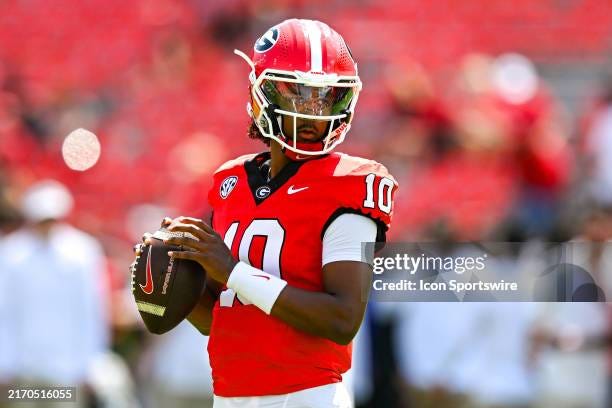Spring Portal Opens amidst Chaos
Tennessee stands firm, Iamaleava leaves; Rashada suit still on vs. Fla.
As the College Football Spring Transfer Portal opens its 10-day spring window Wednesday, all hell is breaking loose in a tug-of-war between players chasing huge NIL paydays and teams with their co-conspirators trying to land talent.
The calm of early spring was already broken as college football sailed ahead like the Titanic toward an iceberg ready to tear it apart.
Two quarterbacks, Nico Iamaleava and Jaden Rashada, are the very conspicuous tip of that iceberg. They tore into the vulnerable underbelly of a shaky college football situation that demands guardrails on both sides.
The mass below them included 2,812 players who already transferred this year, with 203 of them at quarterback.
Hall of Football offers the complete transfer list and another with just the quarterbacks in downloadable files below this story.
Rashada enters the portal for a third time, a streak that began when the quarterback accused Florida of welching on a $13.8 million deal in 2023. On Thursday, a U.S. district court judge in Pensacola denied motions to dismiss Rashada’s lawsuit against coach Billy Napier and several others.
Rashada spent 2023 at Arizona State and last season as a backup at Georgia behind Carson Beck, who moved to Miami, where he will follow NFL-bound Cam Ward in an attempt to rehabilitate his own draft value.
On Friday, rumors turned to ugly facts when Iamaleava’s reps pushed demands to double the player’s NIL to $4 million a season before the spring portal opened. Iamaleava was a no-show at practice Friday and did not play in the spring game Saturday.
Tennessee head coach Josh Heupel held his ground.
“Man, listen, it’s the state of college football,” Heupel said on The Vol Network radio broadcast. “At the end of the day, no one is ever bigger than the program. That includes me, too. We’ve got an opportunity. We’ve got a bunch of guys that will give their all for Tennessee."
“We move forward," he added. "Got a great group. Let’s go compete.”
Ironically, Rashada was quickly mentioned as a replacement for Iamaleava. But if Rashada stays in the SEC he must sit out a year.
As for Iamaleava, although he wasn’t offered a deal as big as Rashada’s, the beginning of his relationship with Tennessee was deep — into the Vols’ pockets.
In the spring of 2022, Iamaleava, as a high school junior, agreed to a four-year deal worth approximately $8 million with Tennessee's NIL collective, Spyre Sports Group. Reports indicate it included a $350,000 up-front payment with money paid out during his senior season at Warren High School in California.
It was a bold, and strategically smart, play by Tennessee. While other schools were wading cautiously into NIL and the NCAA was feverishly trying to set up so-called "guardrails," the Vols alertly saw where things were headed. When the NCAA eventually challenged the deal, the state's attorney general stepped in and won an injunction.
Now, however, the player who was once cheered and who was paid millions before becoming the full-time starter is the poster child for NIL backlash. Rather than play out the final season of his deal—which would pay him about $2.2 million—Iamaleava reportedly wanted some $4 million commensurate with pay to other quarterbacks who transferred this year.
ESPN’s Max Olsen rates Iamaleava as the No. 1 player in the portal when it opens Wednesday.
Tennessee has invested a ton of money in Iamaleava and even successfully fought off an attempted NCAA investigation into the seven-figure agreement he struck with the Vols as a four-star high school recruit. He had an awful lot of hype to live up to as a redshirt freshman starter in 2024 and put together a solid year, throwing for 2,616 yards, completing 64% of his passes with 22 total touchdowns and nine turnovers while leading the Vols to 10 wins.
Iamaleava closed out the season with a rough CFP performance, completing 14 of 31 passes for 104 yards in a 42-17 first-round loss to eventual national champ Ohio State, and still has plenty of room to grow. But it is exceptionally rare that a QB of his caliber becomes available in the spring.
🏈🏈🏈🏈🏈🏈🏈🏈🏈🏈🏈🏈🏈🏈
Download All Transfers in file Below Chart
Download data on more than 2,200 CFB Transfers
🏈🏈🏈🏈🏈🏈🏈🏈🏈🏈🏈🏈🏈🏈
Download data on more than 2,200 CFB Transfers
🏈🏈🏈🏈🏈🏈🏈🏈🏈🏈🏈🏈🏈
House v. NCAA settlement:
Lawyers file supplemental brief, reaffirm stance on roster limits
Attorneys in the House v. NCAA settlement filed a supplemental brief late Monday after Judge Claudia Wilken expressed concern about the current language regarding roster limits. Wilken told both sides to respond one week after the final approval hearing took place.
During the hearing, Wilken suggested possibly grandfathering athletes currently on rosters before the limits under the settlement go into effect. That, as a result, would ensure no one loses their current spot on a team amid changes to rosters in all sports.
The NCAA looked into Wilken’s suggestion about changing the roster-limits verbiage, according to the brief. Ultimately, attorneys said such a decision would cause a “significant disruption.”
“The Parties appreciate the perspective and heartfelt stories that the student-athletes who objected shared, including those shared at the hearing,” the filing states. “Defendants have evaluated – and discussed with numerous member institutions – the Court’s suggestion to ‘grandfather’ in the roster limits. Defendants, however, have informed Class Counsel that those discussions revealed no practicable way to do so, because ‘grandfathering’ roster limits would cause significant disruption.
“The Parties are both independently aware that member institutions and student-athletes have been making decisions in anticipation of the roster limits being immediately effective if the Settlement is approved.”
If the House v. NCAA settlement receives full approval, proposed rosters include football (105), men’s and women’s basketball (15), baseball (34), men’s and women’s soccer (28), softball (25) and volleyball (18). Schools around the country started to prepare for such changes to go into effect, which is why the NCAA argued that altering the language would create issues.
Roster limits took center stage during House v. NCAA hearing
Early in last week’s 6.5-hour hearing, Wilken suggested to NCAA attorney Rakesh Kilaru there be an exception for athletes currently on rosters before the changes take place. That would effectively create a grandfather clause for current athletes who might otherwise lose their spots on the roster as part of the limits under the settlement.
Roster limits were key points from objectors who spoke during the hearing, as well. Utah swimmer Gannon Flynn passionately spoke against such limits, arguing athletes are living in constant fear of being cut as a result.
“If you don’t have a perfect season,” Flynn told Wilken, “you might not get another.”
During the latter portion of the hearing when she had questions for both Kilaru and plaintiffs’ attorney Jeffrey Kessler, Wilken again suggested the idea of grandfathering athletes prior to the final 10-minute break. Kilaru then pointed out the rationale behind setting the roster limits, which he said was to help minimize disruptions. He added that cuts could happen even without the settlement.
Wilken told both sides there are parts of the settlement they “can fix” toward the end of last week’s hearing. But, she added, “Basically, I think it’s a good settlement.”
Editor’s note: Story includes content from 24/7, On3 and other wire sources









